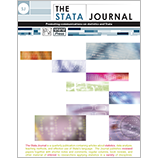
Controlling for time–dependent confounding using marginal structural models
This article describes the use of marginal structural models (described by Robins, Hernán, and Brumback [2000]) to estimate exposure or treatment effects in the presence of time-dependent confounders affected by prior treatment. The method is based on deriving inverse-probability-of-treatment weights, which are then used in a pooled logistic regression model to estimate the causal effect of treatment on outcome. We demonstrate the use of marginal structural models to estimate the effect of methotrexate on mortality in persons suffering from rheumatoid arthritis. View all articles by these authors: Zoe Fewell, Miguel A. Hernán, Frederick Wolfe, Kate Tilling, Hyon Choi, Jonathan A. C. Sterne View all articles with these keywords: marginal structural models, causal models, weighted regression, survival analysis, logistic regression, confounding Download citation: BibTeX RISDownload citation and abstract: BibTeX RIS |